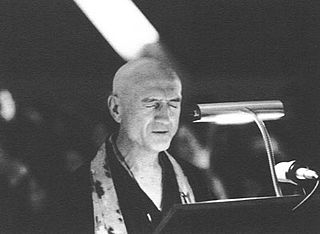A Quote by Giovanni Boccaccio
My mind is wholly possessed by Love, who rules every part there of, in virtue of his all-embracing deity.
Related Quotes
If love is the soul of Christian existence, it must be at the heart of every other Christian virtue. Thus, for example, justice without love is legalism; faith without love is ideology; hope without love is self-centeredness; forgiveness without love is self-abasement; fortitude without love is recklessness; generosity without love is extravagance; care without love is mere duty; fidelity without love is servitude. Every virtue is an expression of love. No virtue is really a virtue unless it is permeated, or informed, by love.
But his Lordship [tells]us that God is wholly here, and wholly there, and wholly every where; because he has no parts. I cannot comprehend nor conceive this. For methinks it implies also that the whole world is also in the whole God, and in every part of God. Norcan I find anything of this in the Scripture. If I could find it there, I could believe it; and if I could find it in the public doctrine of the Church, I could easily abstain from contradicting it.
Prejudice is of ready application in the emergency; it previously engages the mind in a steady course of wisdom and virtue, and does not leave the man hesitating in the moment of decision, skeptical, puzzled and unresolved. Prejudice renders a man's virtue his habit; and not a series of unconnected acts. Through past prejudice, his duty becomes part of his nature.
In [the soul] one part naturally rules, and the other is subject, and the virtue of the ruler we maintain to be different from that of the subject; the one being the virtue of the rational, and the other of the irrational part. Now, it is obvious that the same principle applies generally, and therefore almost all things rule and are ruled according to nature.
For the ordinary man, whose mind is a checkerboard of crisscrossing reflections, opinions, and prejudices, bare attention is virtually impossible; his life is thus centered not in reality itself but in his ideas of it. By focusing the mind wholly on each objects and every action, zazen strips it of extraneous thoughts and allows us to enter into a full rapport with life.
They were afraid of your authentic love, because authentic love is beyond their control.You are possessed by it. You? are not the possessor, you are the possessed. And every society wants you to be in control. The society is afraid of your wild nature, it is afraid of your naturalness, so from the very beginning it starts cutting your wings. And the most basic thing which is dangerous in you is the possibility of love, because if you are possessed by love you can go even against the whole world.
Man in his raw, natural state as he comes from the womb is morally and spiritually corrupt in disposition and character. Every part of his being-his mind, his will, his emotions, his affections, his conscience, his body-has been affected by sin (this is what is meant by the doctrine of total depravity)

































